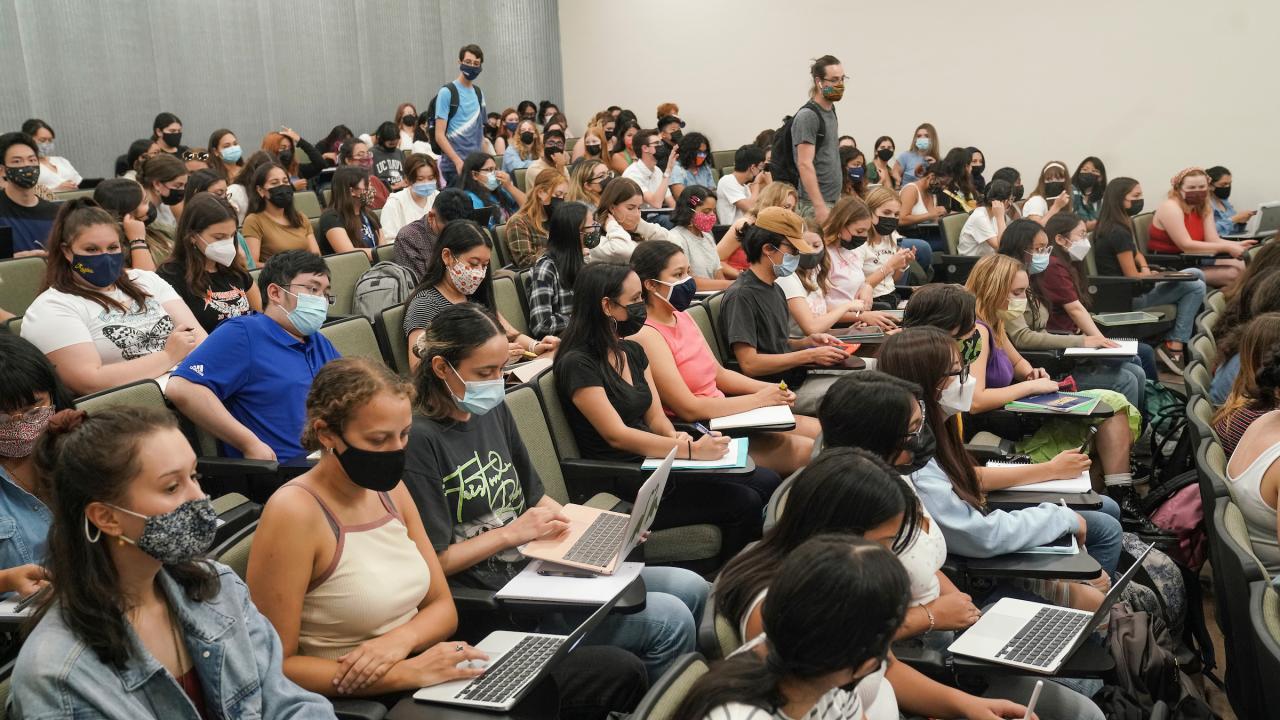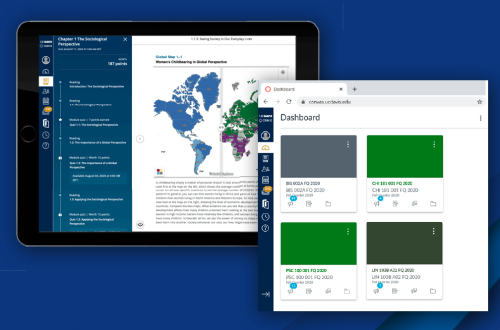
Equitable Access Success Allows Reduced Fees, Grants for Students
Equitable Access, a program pioneered by the UC Davis Bookstore, is working to reduce inequity by addressing the issues of course material cost and access for students. The program went into effect in fall 2020 and far exceeded analysts’ projections with a revenue surplus at the end of its first year.
A portion of this sum—$170,877—went to grants which provided free access to course materials for 1,000 low-income students by covering their cost for the program this fall. The remaining $2 million has gone toward creating a reserve to ensure the program’s flat-rate model remains financially sound, since the number of textbooks assigned, as well as the cost for individual textbooks, can vary so much from class to class.
Ease of Access
Equitable Access launched in fall of 2020, following several years of planning and consultation with students, faculty and a wide array of campus stakeholders.
By paying a quarterly flat rate, students get digital access to all of their course materials, regardless of their major or fluctuations in textbook prices. As with fee-supported programs like Unitrans and mental health services, all undergraduate students are automatically enrolled in Equitable Access—but in contrast, students can choose to opt out during a two-month period that starts before the beginning of the new quarter.
From a faculty perspective … it just reduces classroom management.

The digital textbooks that participating students are assigned through the Canvas Learning Management System (LMS) then travel with them when they add or drop a course. “I think for students, there’s a real ease in it all being in one place,” said Meggan Levitt, assistant vice provost and associate CIO for Academic Applications.
“And then from a faculty perspective … it just reduces classroom management … it’s just kind of an ease of use process for faculty, and then they can focus more on instruction.”
Access and Academic Freedom
“The title, Equitable Access, really identifies the two problems we were trying to solve. Equity and access … more and more students were reporting to us that they were having difficulty affording all of their required textbooks … and their access to 100 percent of the required textbooks was slipping each term,” said Jason Lorgan, executive director of UC Davis Stores and a prime mover behind the program’s development.
For classes where books were too expensive, I didn’t get them.
“For classes where books were too expensive, I didn’t get them,” said Dennis Pimentel-Ruiz ‘20, a student participant in the Equitable Access steering committee, to UC Davis Magazine in January 2020. “I felt disadvantaged compared to people who could afford them.” For many students, high and variable textbook costs are a restriction on academic freedom of choice—and a very real barrier to equity in the classroom.
Increased Efficiency, Reduced Fees

Survey data collected in the program’s first year shows a significant rise in the number of undergraduate students reporting access to all of their required textbooks with Equitable Access: 22,661 as compared to 6,819 before the program launched.
Nearly 75 percent of participating students said they felt free to choose the courses they were most interested in without worrying about textbook prices, knowing that all of their course materials were included with Equitable Access.
The Equitable Access quarterly charge had already come down by the start of the program’s second year. Based on its 2020–21 performance, students received a 15 percent reduction in their quarterly rate starting in fall 2021—from $199 to $169 per term—compared to the previous year.
Given that textbooks and supplies for one year at UC Davis cost around $1,136, and just one textbook for a STEM class can cost as much as $265 new, this pricing model provides a significant savings for many students.
This is something we think is unique to UC Davis ...
“By pooling students’ money together, we are not only able to negotiate great pricing from publishers, but are able to provide textbook grant funding for our lowest-income students,” said Lorgan. “After the first year, we were able to fund the textbook costs for 1,000 of our lowest income students and are working to expand that number to several thousand by next year.” Integral to the success of this model is the cost savings achieved on the front end through price negotiations with textbook publishers.
A Unique Opportunity
“This is something we think is unique to UC Davis,” said Lorgan. “We are not aware of any other college bookstore that has a program that is able to provide funding for thousands of their lowest-income students.”
Recent national recognition attests to this. In June, the Equitable Access program was awarded the 2021 IMS Global Learning Impact Award for Digital Learning Networks. IMS Global, of which UC Davis is a member, is a non-profit collaborative advancing edtech interoperability and innovation.
Looking ahead, Jason Lorgan affirms that the quarterly charge students pay will continue to come down, and more grants will be distributed to students. The newly formed Equitable Access Student Advisory Council, comprising 10 students and one faculty and staff, will meet quarterly to provide feedback and advice on ways of enhancing the program. “As the program achieves greater levels of success, we will be able to completely fund textbook expenses for thousands of students,” said Lorgan.
About the author
Nat Sellman, Content Specialist for Student Affairs Marketing and Communications, can be reached at nscuriel@ucdavis.edu.